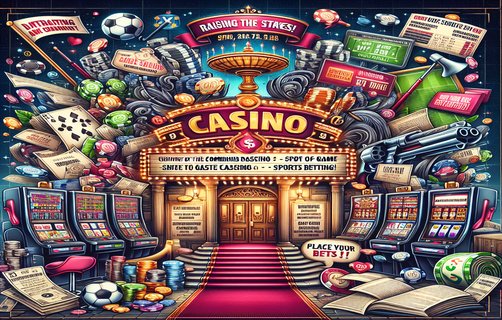Innovation and Strategy in Online Betting: A Multifaceted Analysis
In the rapidly evolving landscape of online betting, successful participants leverage numerous strategies and innovations to optimize their engagement and profitability. This analysis explores various aspects of online betting, including instant bonuses, squeeze plays in poker, in-game betting, slot RTP, gameplay personalization, time management, and eSports gambling. By examining these elements from multiple angles, we can gain a comprehensive understanding of the economic principles underpinning this lucrative industry.
Instant bonuses have become a staple of online betting platforms. These promotions are not merely a marketing gimmick; they hold profound implications for consumer behavior. Economic theory posits that incentives significantly influence decision-making. Instant bonuses enhance the perceived value of placing a bet by effectively lowering the barrier to entry. From a microeconomic perspective, they shift the demand curve to the right, attracting a higher volume of players. This strategy of price promotion aligns with the behavioral economics notion that players exhibit a preference for immediacy, often valuing present rewards more than future ones.
Transitioning to the poker table, squeeze plays embody a sophisticated strategy that illustrates the balance of risk and reward. By applying game theory principles, players can analyze their opponents' behaviors and positions. A squeeze play is executed when a player senses weakness in their opponents, often after one or more players have limped into the pot. The successful execution relies heavily on understanding the probabilities associated with the players' potential hands—an exercise in expected utility maximization. Much like economic speculation, the squeeze play capitalizes on the behavioral tendencies of opponents, creating a high-potential payout against the risk of a significant bet. Thus, it underscores the role of strategic decision-making in maximizing profit in competitive environments.

Moving onto in-game betting, we see a transformative innovation that has recalibrated the betting landscape. Unlike traditional pre-game wagers, in-game betting allows participants to place bets in real-time as events unfold. This mechanism introduces a dynamic interaction layer that significantly alters the risk-reward equation. Economically, it reflects a form of continuous market adjustment reminiscent of stock trading. Players can revise their strategies based on live data, responding to changes in momentum, player performance, and even weather conditions. The ability to react swiftly to real-time information can lead to significantly higher returns for those who are well-informed and strategically agile.
Factors such as slot RTP (Return to Player) are crucial for gamblers, as they represent the theoretical percentage of wagered money returned to players over time. This metric can significantly influence betting behavior. An economic understanding of probability and risk suggests that higher RTP games tend to attract more players. Consequently, operators must balance RTP with profitability, creating a constant tug-of-war between consumer attraction and sustainable business practices. Strategic positioning in offering games with favorable RTP can ultimately dictate a casino's market success.

Gameplay personalization presents another lens through which online betting platforms enhance user experience. By leveraging data analytics and machine learning, operators can tailor their offerings to better meet individual player preferences. This not only increases user engagement but also fosters brand loyalty—an essential factor in a highly competitive market. Economic models of consumer choice suggest that personalization leads to a lower price elasticity of demand, meaning players are less likely to switch platforms if their unique preferences are recognized and catered to.
Effective time management remains an essential skill for both casual and professional gamblers. With a plethora of betting options, managing one's time invested in various platforms can significantly affect one’s profitability. Concepts from economics suggest that opportunity cost is always at play; thus, judiciously allocating time to more favorable betting opportunities is pivotal for maximizing returns. Furthermore, relentless engagement in gambling without a structured time constraint can lead to diminishing returns and potentially compulsive behavior.
Lastly, the emergence of eSports gambling has been a game-changer in the realm of online betting. This sector taps into the intersection of technology, entertainment, and competitive gaming, appealing to the younger demographic. As eSports continues to grow, the betting opportunities expand, leading to innovative betting formats and market dynamics. Economic theories of supply and demand are at the forefront of this evolution, as increased interest inevitably creates a higher demand for betting options, prompting platforms to cater to this niche enthusiastically.
In conclusion, the online betting industry is a rich tapestry woven with intricate economic principles and innovative strategies. Understanding and deploying concepts such as instant bonuses, advanced poker strategies, in-game dynamics, RTP, personalized experiences, time management, and eSports can culminate in a successful betting strategy. As this industry continues to evolve, so too will the economic analyses that shed light on its complexities, ensuring that both operators and players can navigate this ever-changing landscape effectively.
